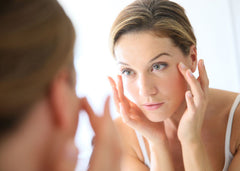
By Michael Goodman, M.D.
Forever Health Network Practitioner
The title of this blog was taken from the title of an editorial on the subject by Dr. M. Julie Thornton of the U.K.1, in which she opines on a research article published in the February 2016 issue of Menopause.2
The original research studied the potential adverse effects of removing ovaries at time of hysterectomy on skin aging in pre-menopausal women. Their conclusions were that this sudden loss of estrogen via removal of ovaries is a significant and independent factor for worsening skin sagging and dryness, and they deduced that these low-estrogen skin changes were an additional factor associated with diminished quality of life.
Human skin is a complex organ accounting for approximately 15% of the total body weight of most adults. It provides a first line of defense against environmental stresses including infection, UV radiation, dehydration, and physical damage. It also regulates body temperature, water balance, excretion, and synthesis of vitamin D.
With aging, skin undergoes significant changes due to atrophy of all three layers – the epidermis, dermis, and hypodermis. The result is reduced thickness, increase in the number and depth of wrinkles, increased dryness, and diminished vascularity, firmness, and elasticity. Skin aging is also associated with poorer wound healing, as estrogen modulates all phases of wound healing.
Other research has previously found that older postmenopausal women are at lower risk of developing skin ulcers if they are on estrogen replacement.
Specifically, the original study found that all skin parameters in the estrogen loss group of women worsened on weeks 24 and 48:
- Laxity/sagging and texture/dryness were significantly worse.
- The “emotions and symptoms” subscales of the questionnaire used were significantly higher.
The role of estrogen deficiency in the age-related changes in the structural and functional integrity of skin is well-known and evidence-based. In older women, the decrease in skin thickness and collagen content relate more closely with the period of estrogen deficiency than age, and indeed the decrease in skin collagen parallels the reduction in bone mass seen in postmenopausal women not using estrogen supplementation.
The authors concluded, “The diverse functions of estrogen in a wide range of tissues in both sexes, including bone, brain, skeletal muscle, adipose tissue, colon, vascular system, and skin are now well-recognized, and the loss of estrogen in postmenopausal women has a negative impact on many aspects of female health, leading to conditions such as osteoporosis and an increased risk of cardiovascular disease.”2
The original study is different from other studies that have explored the effect of estrogen loss on skin aging, as this is a true controlled study, comparing a group of women undergoing hysterectomy with another group of women undergoing hysterectomy along with removal of ovaries.
Although the results of the study are not surprising, this study highlights the rapid aging of skin in the absence of estrogen, with significant changes observed as early as 6 months of estrogen deprivation.
The consequences of these changes are most apparent on the face and other sun-exposed areas. In Western societies, many women consider the appearance of their skin and hair to reflect their general health and well-being, and significant visible deterioration involving skin aging may impact their “quality of life.”
References
- Menopause 2016;23:119-120.
- Menopause 2016;23:138-145.
